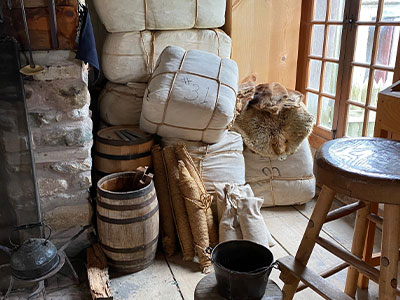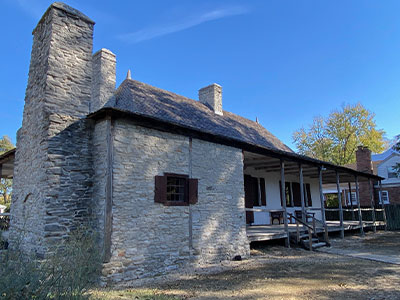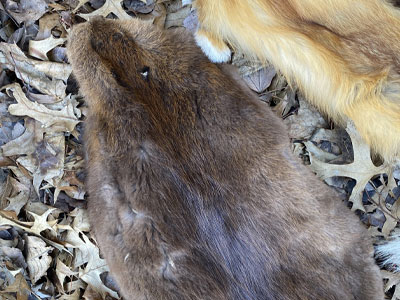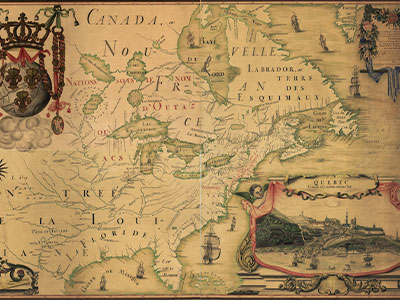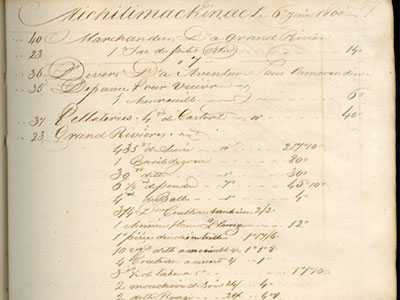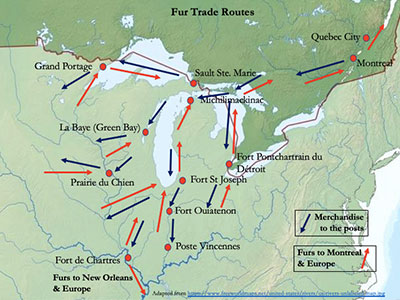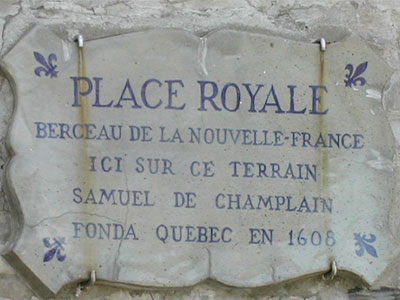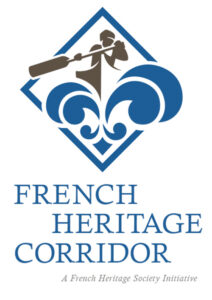
For General Information
about FHC
Lisa Kahn, Director
French Heritage Corridor Initiative
fhschicago@frenchheritagesociety.org
The 7 FHC Ambassadors
(IA) Ceil Miller-Bouchet
ceilmillerbouchet@gmail.com
(IL) James Paul
jpaul764@hotmail.com
(IN) Rob Mann
rmann@weintrautinc.com
(MI) Michael Nassaney
michael.nassaney@wmich.edu
(MN) Gregory Cash
gregorydcash@gmail.com
(MO) Tandy Thompson
tctetal@gmail.com
(WI) Michael Poma
michael.poma@sbcglobal.net
Leadership Team
Dr. Charles Balesi
Author and Historian
Amy Fienga
FHS Paris affiliate and Co-Chair of the Student Exchange Program
Sylvette Niccolini
Chairman FHC and FHS Chicago Advisory Panel
Marc Rosier
Author and Historian
Logan York
Tribal Historic Preservation Officer for the Miami Tribe of Oklahoma
Honorary Committee
The Honorable Yannick Tagand
Consul Général de France in the Midwest
Princesse Marie Sol de La Tour d’Auvergne
Baronesse Isabelle de Laroullière
Madame Jeanne Lamy-Belzil
Public & Governmental Affairs Officer, Délégation du Québec à Chicago
Randa Duvick
FHC Module Developer
Diane Hunter
Myaamia Heritage Preservation Specialist
Julie Kemper Foyer
William T. Kemper Foundation
Perri Irmer
President & CEO, DuSable Black History Museum and Education Center: A Smithsonian Affiliate
Jeanne Gang
Architect and Founding Principal and Partner of Studio Gang
Andrew Nussbaum
Wisconsin Department of Tourism
Our Mission
The French Heritage Corridor initiative comprises seven states in the Midwest (Iowa, Illinois, Indiana, Michigan, Minnesota, Missouri, and Wisconsin). This network, joined by waterways connecting with the Mississippi River and the Great Lakes, transcends borders to recreate in the Midwest what was once la Nouvelle France.
While French history and heritage of eastern Canada and of Louisiana is typically well known and understood by the general public, the region comprising the French Heritage Corridor which lies between them is not as universally appreciated.
The French Heritage Corridor (FHC) is an initiative of FHS Chicago-Midwest chapter dedicated to developing synergy and raising the collective awareness about the rich French history and heritage that has, since the 17th century, melded with the vibrant multicultural landscape in what is today the Midwestern United States.
French Heritage Society is an American non-profit organization created in 1982 that includes 10 chapters in the US and one in France.
Through various activities and our educational program, we are dedicated to preservation, restoration and promotion of the beautiful French heritage throughout the United States and France.
The central mission of French Heritage Society is to ensure that the treasures of our shared French architectural and cultural heritage survive to inspire future generations to build, dream, and create by:
- Preserving the rich French architectural and cultural heritage throughout France and in the US by raising funds for restoration, preservation and cultural grants.
- Transmitting and safeguarding the skills, knowledge and love of the heritage through transatlantic educational programs for students, architects, artisans, art connoisseurs and collectors.
- Fostering Franco-American friendship and cross-cultural exchange through select tours in France and the U.S., lectures, conferences, galas and other events on both sides of the Atlantic.
Click here to make a fully tax-deductible donation to the French Heritage Corridor Initiative.
Discover French Heritage Sites in the Midwest
- All Locations
- Overview (8)
- Historic Sites (60)
- Museums (23)
- Parks / Preserves (30)
- Corridor / Trail (2)
- Historical Societies (25)
- Native American / French (14)
- Cultural Immersion (7)
- Historic Markers (9)
French Heritage Corridor Events
- March 26th from 10:30 a.m. to 11:30 a.m.: RendezVous Illinois: French History in the Midwest – Peoria Riverfront Museum, 222 SW Washington St., Peoria, IL https://cart.peoriariverfrontmuseum.org/Performance.aspx?pid=58345&cal=https%3a%2f%2fcart.peoriariverfrontmuseum.org%3a443%2fcalendar.aspx
- March 27th at 6:30 p.m.: Festival de la Francophonie – Film Screening: Tales of the Franco-Midwest featuring films directed by Brian Hawkins and André Gladu https://www.af-chicago.org/events/festival-de-la-francophonie–screening-of-short-films-brian-hawkins-andr%C3%A9-gadu/
- March 30th from 2:00 p.m. to 3:00 p.m.: Join Kathy Krause, professor emerita of French at the University of Missouri – Kansas City as she presents The Role of French Women in the Founding of Kansas City. This program is co-hosted by the Alliance Française de Kansas City, and the Kansas City Athenaeum in honor of Women’s History Month – Central Library Helzberg Auditorium, 14 West 10th Street, Kansas City, MO https://kclibrary.org/events/role-french-women-founding-kansas-city
- April 4th from 4:00 p.m. – 5:30 p.m.: Fort Night Poster Party at Niles District Library, 620 E. Main St.
Niles, MI https://nileslibrary.com/single-event/fort-night- poster-party/ - April 5th – 6th: Fort de Chartres Colonial Market Faire, Fort de Chartres State Historic Site, State Route 155, Prairie du Rocher, IL,https://fortdechartres.net/2024-fdc-colonial-faire/
- April 23rd – 26th: Fifth Annual French Heritage Corridor Conference, Washington University, St. Louis, MO You’re Invited: French Heritage Corridor 5th Annual Conference – April 24, 2025
- April 26th from 9:30 a.m. to 10:00 p.m.: Join The American Friends of Lafayette for a fantastic day of programming including Brunch at the Chatillon-DeMenil Mansion, St. Louis Riverboat Cruise, Welcome Lafayette on the St. Louis Riverfront, and St. Louis Lafayette Bicentennial Ball. Attend one event, or attend them all! Find all registration information here: https://friendsoflafayette.wildapricot.org/events?EventViewMode=1&EventListViewMode=2&SelectedDate=4/14/2025&CalendarViewType=1
- May 1st at 7:00 p.m.: Jason Lee Willis will discuss the life and times of Joseph Nicollet (known for mapping the Upper Mississippi River Basin in the 1830s) at the Dupuis House located at the Sibley Historic Site at 1357 Sibley Memorial Highway in Mendota, MN, https://fahfminn.org/jason-
lee-willis/ - May 17th at 5:00 p.m.: Sesquicentennial Celebration: Soirée de Bourbonnais, The Grove, 700 Main Street NW, Bourbonnais, IL
- June 7th – 8th: 55th Annual Fort de Chartres Rendezvous, Fort de Chartres State Historic Site, State Route 155, Prairie du Rocher, IL https://www.lewisandclark.travel/events/rendezvous-at-fort-de-chartres/
- June 14th – 15th from 10:00 a.m. to 4:00 p.m.: Roll up your sleeves and get ready to dig! Join the Historic Indian Agency House at Fort Winnebago to play an important role in expanding our historical understanding of how the Fort Winnebago Indian Agency and blacksmith shop functioned in the early 1830s – Historic Indian Agency House, 1490 Agency House Road, Portage, WI https://www.agencyhouse.org/archaeology
- June 21st – 22nd from 10:00 a.m. to 4:00 p.m.: Join the Historic Indian Agency House for blacksmithing demonstrations! – Historic Indian Agency House, 1490 Agency House Road, Portage, WI https://www.agencyhouse.org/events
- June 28th at 1:00 p.m.: Attend Ho-Chunk Cultural Arts Day to see unforgettable music and dance performances, and participate in a basket weaving workshop! Co-hosted by the Ho-Chunk Nation Museum and Cultural Center and the Historic Indian Agency House – Historic Indian Agency House, 1490 Agency House Road, Portage, WI https://www.agencyhouse.org/_files/ugd/5b9baf_de505b93c98e4281b4d37b24877c5522.pdf
- July 8th at 6:30 p.m.: Come hear Vicki Twinde-Javner, Senior Research Archeologist, Mississippi Valley Archeological Center present at the Hearth & Home 2025 Speaker Series hosted by the Historic Indian Agency House, 1490 Agency House Road, Portage, WI https://www.agencyhouse.org/_files/ugd/5b9baf_d2b1344754fc4df6afde172cc61a353c.pdf
- August 12th at 6:30 p.m.: Come hear Tamara Funk, Curator, WI Historical Society present at the Hearth & Home 2025 Speaker Series hosted by the Historic Indian Agency House, 1490 Agency House Road, Portage, WI https://www.agencyhouse.org/_files/ugd/5b9baf_d2b1344754fc4df6afde172cc61a353c.pdf
- September 27th – 28th: Bourbonnais sesquicentennial French Heritage Weekend, The Grove, 700 Main Street NW, Bourbonnais, IL, https://bourbonnaishistory.org/french-heritage-weekend
- September 27th from 7-9 pm, Bourbonnais sesquicentennial history pageant “Hooray Bourbonnais II/Deux”, The Grove, 700 Main Street NW, Bourbonnais, IL https://bourbonnaishistory.org/french-heritage-weekend.
- October 4th from 6:00 – 7:00 p.m.: Gather around the campfire for the second installment in the Historic Indian Agency House’s Campfire Series! Hear “Jacques Largillier” (Glenn Gorsuch) tell in first-person what voyageur life was like in 1832 – Historic Indian Agency House, 1490 Agency House Road, Portage, WI https://www.agencyhouse.org/_files/ugd/5b9baf_36d5532b68d64452a67b1874c653efa8.pdf
- October 11th – 12th: Feast of the Hunters’ Moon, West Lafayette, IN, http://feastofthehuntersmoon.org
- November 1st – 2nd: Fort de Chartres Winter Rendezvous & Woodswalk, Fort de Chartres State Historic Site, State Route 155, Prairie du Rocher, IL
- November 8th from 5:00 p.m. to 6:00 p.m.: Gather around the campfire for the third installment in the Historic Indian Agency House’s Campfire Series! Hear accomplished storyteller Andi Cloud (Niizuwii, “Rain Woman”) tell traditional Ho-Chunk stories – Historic Indian Agency House, 1490 Agency House Road, Portage, WI https://www.agencyhouse.org/_files/ugd/5b9baf_36d5532b68d64452a67b1874c653efa8.pdf
- November 13th from 5:30 p.m. – 9:00 p.m.: Bourbonnais Grove Historical Society’s Eighth Annual Fleur-de-Lis Celebration Dinner, Kankakee Country Club, 2011 Cobb Blvd., Kankakee, IL https://bourbonnaishistory.org/fleur-de-lis-celebration
- December 31st: La Guiannee at Fort de Chartres, Fort de Chartres State Historic Site, State Route 155, Prairie du Rocher, IL
French Heritage Corridor Initiatives
Conferences
Click here to discover our First Annual Conference, “A Midwest Renaissance”, held in May 2021 in Prairie du Rocher, IL.
Click here to discover our Second Annual Conference, “Making our Dream a Reality”, held in May 2022 in Lafayette and West Lafayette, IN.
Click here to discover our Third Annual Conference, “We’re All In This Together!”, held in June 2023 in Prairie du Chien, WI.
Click here to discover our Fourth Annual Conference, “What’s Cooking: la recette for Creating Collaboration in the French Heritage Corridor”, held in May 2024 in Monroe, MI.
History Module
Click on the links below to see our module presenting a suite of information on the history of the French Heritage Corridor, including the arrival of the French, introductions to state-by-state French heritage, teaching materials, and more.
Module d’histoire en français
Pour voir la suite de pages qui présentent l’histoire du Corridor en français, cliquez ici.
Bienvenue!
The French Heritage Corridor invites you to discover this region’s rich history and culture. The resources presented here–written materials, maps, images, and more–will help you get to know this distinct heritage.
Whether we’re residents or visitors, our first hint that this region has a French past often comes through an encounter with its many place names of French origin: Prairie du Chien, Detroit, Joliet, Vincennes, Des Moines, Dubuque, Mille Lacs, Portage, La Crosse, Bourbonnais, Ste. Genevieve, St. Louis, Sault Ste. Marie, Marquette—the list goes on and on!
How did there come to be so many places reflecting a past with French connections? The materials here help to answer that question, and many more.
A section introducing the French colonial presence in the French Heritage Corridor.
Here, you can explore history more in depth about IA, IL, IN, MI, MN, MO and WI and access additional resources such as teaching tools, suggested tours and connect to active groups.
A section that describes the workings of the fur trade. It underlines theimportant relationship between the French and their Native trading partners.
A section that introduces seventeenth-and eighteenth-century French maps and invites you to think about what and who the French explorers encountered as they moved westward and southward in this region.
A section presenting the account books of one French-speaking fur trader who worked in this region.
A section for learners or speakers of French that offers French-language information about the region’s French heritage. The texts are appropriate for high school or college language learners, and are accompanied by pedagogical activities that can be adapted by teachers.

